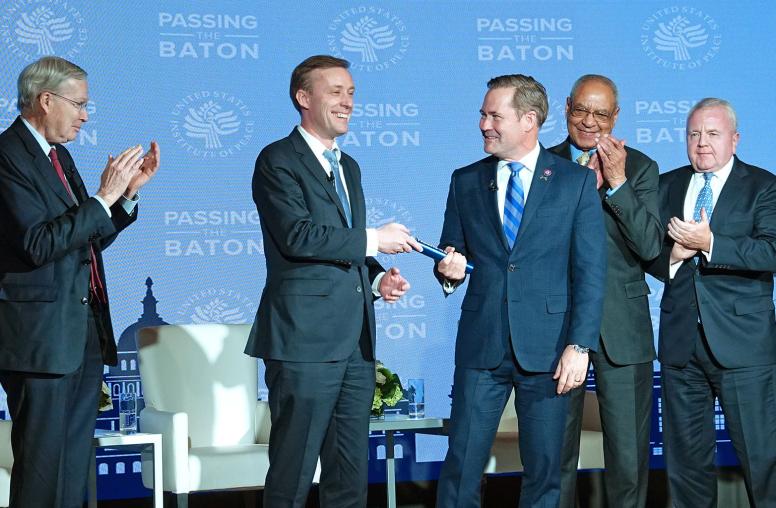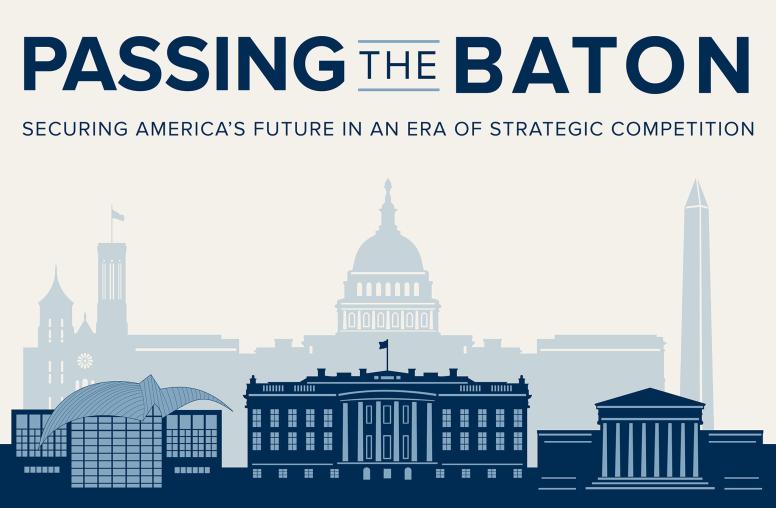Disarming Iraq: Problems and Prospects
Newsbyte explores highlights from Institute Hill briefing on Iraq and weapons of mass destruction.
WASHINGTON—The likelihood of war with Iraq now hinges on the outcome of the UN mandated inspections that begin in earnest this week. While the terms of these latest inspections—known as UNMOVIC—are different from the earlier inspection and disarmament program—known as UNSCOM—that began after the Gulf War in 1991, there are still important lessons to be learned from its experience. The knowledge gained in these earlier inspections also points to the enormous challenges now confronting UNMOVIC as it commences its task, as well as the likely Iraqi response.
To examine the problems and prospects of disarming Iraq of its weapons of mass destruction (WMD), the United States Institute of Peace held a briefing for senior congressional staff on November 20. The briefing was sponsored by Senators Tom Harkin of Iowa and Arlen Specter of Pennsylvania.
Panelists James Sutterlin, Yale University lecturer and co-author (with Jean Krasno) of Defanging the Viper: The United Nations and Iraq (an Institute-funded book on the UNSCOM experience); David Kay, Potomac Institute senior fellow and former UN chief nuclear weapons inspector; and Jonathan Tucker, Institute senior fellow and former member of UNSCOM, provided their perspectives and engaged in a wider discussion of the issues.
Looking Back: Lessons of UNSCOM
The UNSCOM experience provides many lessons relevant to today's inspection process. Among the most important are the following:
- Maintain the unity of the Security Council. Although Iraq never fully complied with the earlier resolutions of the Security Council, neither did it fully ignore them. As long as the Security Council remained united, Iraq reacted in a way that at least kept UNSCOM operational. When unity collapsed, Iraq ignored the Security Council. As Sutterlin argued, "Council unity is the best way to make war less likely."
- Maintain the credibility and relative independence of the inspections process. UNMOVIC's leadership must be credible and retain the confidence of the Security Council, especially the five permanent members. The first executive chairman of UNSCOM was able to do this, the second was not. Hans Blix, the executive chairman of UNMOVIC, must spend a great deal of time and energy personally briefing the Security Council. At the same time, UNSCOM's effectiveness derived to a large extent from remaining relatively independent of the UN Secretariat, allowing it to maintain the necessary freedom for highly intrusive action the respect of the Iraqi leadership, and to obtain and process the sensitive intelligence that the success of the operation depended upon.
- On-site inspections are critical. UNSCOM demonstrated that there is no substitute for on-site inspections keyed by timely and accurate intelligence in generating the critical information necessary to determine compliance. Information provided by defectors and informants was often invaluable in uncovering hidden weapons programs.
- Maintain a credible military threat for non-compliance. Inspections backed by a credible threat to use force to ensure compliance are essential, according to Kay. But, as Sutterlin argued, "Resort to a limited use of force is likely to be counterproductive. In fact, American and British bombings attempting to force Saddam Hussein to cooperate with inspectors had the opposite effect. They gave him an excuse to stop all cooperation without fear of a full-scale attack and at the same time weakened support in the Security Council for UNSCOM."
Looking Forward: Challenges To UNMOVIC
Based on the experiences of UNSCOM, the challenges facing UNMOVIC as it commences the inspections process are enormous. These include, most importantly:
- The Scale and Nature of the Task. Many hundreds of potential WMD producing and storage sites have to be comprehensively inspected including the presidential palaces, which in themselves constitute vast complexes spread over large areas. The task is especially acute for biological weapons, which, as Tucker pointed out, are the easiest to hide and therefore the hardest to detect. "Compared to chemical warfare agents, a militarily significant quantity of biological weapons is on the order of kilograms rather than metric tons. Moreover, the production equipment is relatively compact and hence more concealable."
- The "Dual Use" Conundrum. The most difficult problem is determining whether legitimate civil or commercial facilities have been used to produce WMD. It is especially challenging in the case of biological weapons. As Tucker described, "Nearly all of the equipment and materials needed to develop and produce biological agents are dual use, and hence easy for Iraq to justify for legitimate commercial purposes. Indeed, Iraq has a need for fermented products such as vaccines, biopharmaceuticals, single-cell protein, bio-pesticides, and so forth. A dual use facility, such as a vaccine plant, can be converted temporarily to a biological weapon agent production campaign and then thoroughly cleaned to eliminate signatures of illicit activity." Access to accurate and timely intelligence and weapons expertise will be essential if UNMOVIC is to uncover such activity.
- UNMOVIC's Limited Inspection Capability. The task is all the greater given that the human resources available to UNMOVIC are fewer than UNSCOMs—some one hundred inspectors by the end of the year. As Kay argued, "How realistic is it, therefore, to expect UNMOVIC to do more with less than UNSCOM had at its disposal?" This problem is compounded by the gap in on-the-ground intelligence gathering since UNSCOM ended. Many useful contacts have been lost along with the often vital insights that come from a continuous exposure to local culture and customs.
- Fragile Consensus of the Security Council. While the UN Security Council voted unanimously in favor of inspections, there are nevertheless significant divisions among its members, not least the permanent representatives, on the threat posed by Iraq; the inspections process could expose these divisions and thereby undermine its unity. The grey area surrounding "dual use" capabilities could be a major point of friction. As Sutterlin notes, "Most [Security Council] members will insist that Iraq cannot be expected to eliminate all dual capacity facilities, or expel all knowledgeable scientists. The solution lies in monitoring as provided for in resolution 715. But this question can prejudice the executive chairman and/or the unity of the Security Council."
- Challenges to the Credibility and Independence of UNMOVIC. This issue will be much harder for UNMOVIC for several reasons—its establishment under more stringent UN Secretariat rules and personnel procedures, the likelihood of strong U.S. pressure, and Iraqi concerns that the real purpose of the inspections is to provide a pretext for regime change. Similarly, maintaining the unity of the operation will also be harder, given the considerable latitude for differences of interpretation over problems such as the dual use issue. UNMOVIC, like UNSCOM before it, must also be wary of disgruntled or disloyal staff members.
- The Corrosive Effects of Time. The debilitating effect of the passage of time without closure had adverse consequences for UNSCOM. If the inspection procedure goes on for a year or more and sanctions remain in effect, support for the operation will diminish. But there will be little compensating support for resorting to war. "This is a concern that many in Washington are only now beginning to appreciate," according to Sutterlin.
How Might Iraq Respond?
By December 8th the Iraqi government must provide the UN Security Council with a full accounting of any and all prohibited programs as specified in UN Resolution 1441. To David Kay, Iraq has four options: 1) admit to and open up its entire WMD program for disarmament; 2) totally deny any possession of WMD weapons; 3) declare possession of a few WMD weapons that it has recently found and offer them for destruction; and 4) "cooperate" by providing a single WMD "program line" for the inspectors to "clean up." Iraq's past history of concerted concealment and deception is not encouraging that it will "come clean." Kay considered the last course of action, therefore, to be the most likely.
If that is true, the Iraqi regime is most likely to give up its chemical weapon capabilities before its nuclear and biological weapons program. The latter are considered not just more potent but also confer more deterrent power and political status to Saddam Hussein.
"Saddam Hussein's image is vital to himself and in the region, partly because he's the only one with weapons of mass destruction," said Sutterlin. "His image and his power in the region both diminish if the United Nations and he himself make public a decrease or lack of weapons capacity."
Although it is possible that Iraq could have moved biological weapons capabilities outside the country, it seems unlikely, given Saddam's determination to maintain tight control over his WMD capabilities. During the Gulf War, for example, Saddam Hussein's strategic chemical and biological warheads remained under the control of the Special Security Organization, which reports directly to Saddam Hussein, rather than the regular army. Nevertheless, transfer of WMD weapons to terrorist organizations outside of Iraq cannot be ruled out, according to Sutterlin.
All the panelists raised the possibility that Saddam Hussein might choose to cooperate with the inspectors, but with the intention to reconstitute key WMD capabilities at a later date. As Tucker warned, "It would be quite easy for Iraq to reconstitute its bio-weapons program, either at dual use facilities or in clandestine, dedicated production sites. All it needs are seed cultures (which can be hidden away in small vials) and culture media."
For this reason, dual use biological facilities must be subjected to ongoing monitoring to ensure they are not diverted to prohibited production. Any clandestine bio-weapons production facilities that are found can be destroyed outright. Dual use facilities, however, cannot.
Tucker also noted that the U.S. government appears not to have thought through the possibility that the inspection process may be completed without triggering a war. The U.S., he suggested, needs a game plan for ensuring the long-term monitoring of dual use biological facilities, even if the threat of war diminishes and sanctions are lifted.
The views summarized here reflect the discussion at the meeting; they do not represent formal positions taken by the Institute, which does not advocate specific policies.



